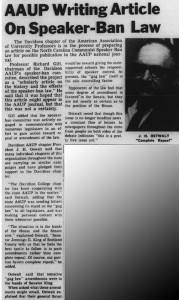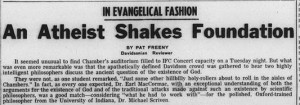Compared to some larger college and universities, Davidson has fewer incidences of conflicts around controversial speakers. Still, Davidson presidents and public relations staff have had to respond to angry letters over guest lectures and even chapel talks. The campus community also got involved in protesting North Carolina’s 1963 Speaker Ban Law. The law, which prohibited public schools from hosting speakers with Communist ties, did not apply to Davidson as a private college.
Education professor Jay Ostwalt wrote a position paper on the Speaker Ban Law noting that “The law is a threat to the vigorous intellectual climate of North Carolina– the state that has become the symbol in the South of intellectual dignity, high purpose and vigorous thought. The nation is watching us and is disappointed in what they see happening. . . . Instead of an image of a vigorous and open society, we are creating the image that we are petty, vindictive, narrow and afraid the future cannot be grasped and guided.

4 April 1965 Davidsonian article.
During the same semester in 1965, college president D. Grier Martin defended the student YMCA chapter’s choice of Paul Goodman as a speaker for a program on sex and ethics. Martin replied to one critic writing that while he shared the concern and “would not have invited” Goodman himself,
“we have followed a policy of giving reasonable latitude to our student groups in the speakers whom they invited to the campus and in most instances this has worked our extremely well. We find that our faculty as well as many members of our student body take the opposite viewpoint from speakers coming to Davidson and this creates intense discussion and usually ends up with the students receiving not only knowledge but wisdom and understanding in some of the complicated matters which are facing all of us in these difficult times.”
Martin was fairly experienced with speaker critics by 1965. His office file on Speakers – Criticism is a full one. The YMCA created another storm of letters with an invitation to Dr. Michael Scriven to speak on “The Non-Existence of God.”

Headline from 7 February 1964 Davidsonian
Concerns expressed by critics include:
“If an atheist came to my home, I think I would try to treat him civilly. But I am sure not going to invite a proponent of atheism to come into my home and unload his wares into the minds of pliable youth.”
“My heart has truly been broken, as I have realized that our Southern Presbyterian Church is in the hands of the liberals.”
“I do not see how any good could come out of having an atheist come to a Christian college, expressing his views to a body of young men. I have taught a Sunday School class for over thirty-nine years at the First Presbyterian Church here and have been teaching teen-agers for many years. I have tried over the years to instill Christian faith into the young people and have been very careful not to bring up anything that would express doubt.”
“I seriously question the wisdom of having on the campus such a speaker as Dr. Scriven. In nation so socially confused and science oriented as America is today, it seems to me that the damage such an individual can do far outweighs any intellectual value he might bring to the students of the school.”
“Most of the atheists and infidels with whom I have talked are narrow minded and will not give God a chance. Neither will they be polite to other persons. Davidson College should invite some Bible Christians to speak publicly. Such as: Senator Strom Thurman of South Carolina, a great statesman.”
Not all the writers opposed the speaker:
“We are both amazed at the apparent fear expressed by some supporting friends of Davidson to allow an open expression of conflicting thoughts within the policy and practice of a church-related institution. . . [We} want you to know of our wholehearted support of the highest level of academic freedom and of religious conviction. Only in this manner can the youth of today be adequately prepared to meet the tremendous influences of this present world as well as the surprising and revolutionary world of tomorrow.”
Only the alumni of the 1960s can say now whether the talks on sex, atheism and communism had any influence or if they even remember the controversies. We can only wonder what 21st century topics could generate the same intense responses as those of the 60s.

Speak Your Mind